What is healthier: sauerkraut or salted cabbage, and how they differ
Sauerkraut has long become a kind of visiting card of Russian cuisine. It is included in many dishes, and is also popular as a stand-alone snack. But pickling is far from the only way to prepare this most useful vegetable. In addition to it, salting and pickling are very common. Each of the canning methods has its own characteristics and imparts different beneficial properties to cabbage.
In the article we will tell you how sauerkraut differs from salted and pickled cabbage, and the benefits and dangers of each of these dishes.
The content of the article
What is the difference between salted, sauerkraut and pickled cabbage
This vegetable, in different varieties, has a firm place in our daily menu, but far not everyone knows what is the difference between sauerkraut, pickled and salted cabbage... Some do not see the difference between them at all. But the creation of these dishes is based on completely different chemical processes.
Fermentation occurs due to the action of lactic acid bacteria, which ferment the sugar released along with the juice. As a result of this process, lactic acid is formed. It does not allow the development of mold and pathogenic bacteria, due to which the product is stored much longer than a fresh vegetable and retains all its taste.
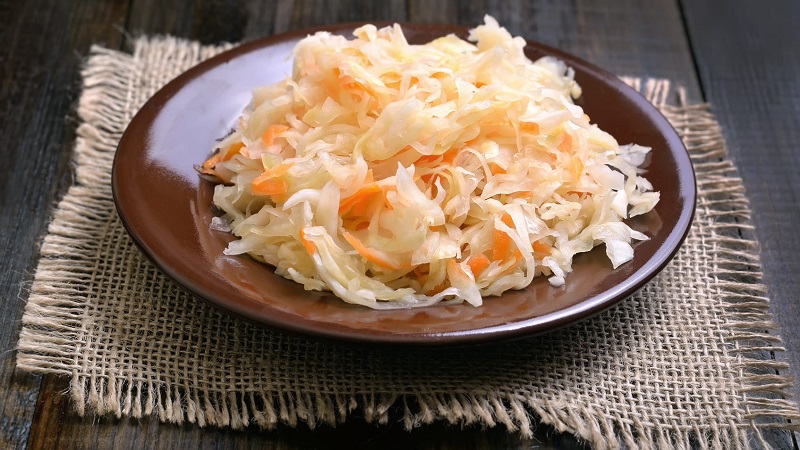
Sauerkraut special in that the taste of fresh vegetables is almost completely preserved with this method of canning... Moreover, this cooking method allows you to get a live product, since all the beneficial bacteria contained in the vegetable do not die, as during salting and pickling.
It is interesting. Fermentation is one of the most ancient ways of preparing food, which appeared even earlier than salt entered the culinary use of man. That is why the original recipe for this dish did not include it at all.
When salting the chopped vegetable is placed in a salty solution... At the same time, much more salt is used - 6-30%, while no more than 2-2.5% of the total volume of the product is taken for fermentation. It is common salt brine that acts as a preservative.
Often, different spices are added to taste during cooking - for example, dill, caraway and peppers, fruits or berries. Seasonings are used in the preparation of pickling, so its taste differs from fresh vegetables much more than when pickled. But the cabbage still remains juicy and crispy.
Pickling is a process that is fundamentally different from pickling andfermentation... If these two methods involve natural fermentation of the product, then during pickling, lactic acid bacteria are not involved in the process.
The role of salt and lactic acid in pickling is played by vinegar. So, the preservative is not formed during fermentation, but is poured ready-made in the form of a marinade. The main advantage of this method is that you can independently regulate the acidity of the product.
Various spices are added to the marinade. Commonly used are sugar, table salt, bay leaves, black or allspice, and cloves. Since vinegar acts as a preservative, much less salt is used to prepare this dish than when salting.
Important! For pickling, you can use any variety of cabbage. Both very young and late autumn vegetables are pickled.
The main difference between pickling and pickling is that acetic acid destroys absolutely all bacteria... This allows you to significantly increase the shelf life of the product, and its taste remains unchanged for much longer.
When pickling with spices and salt, the taste of cabbage changes quite a lot, and acetic acid makes the dish spicy. But some chefs note that the taste is not as bright and multifaceted as during live fermentation.
What is pickling, pickling and pickling for?
The main task of any canning - preservation of freshness and taste of the product. Earlier, harvesting was the only way to eat fruits and vegetables in winter.
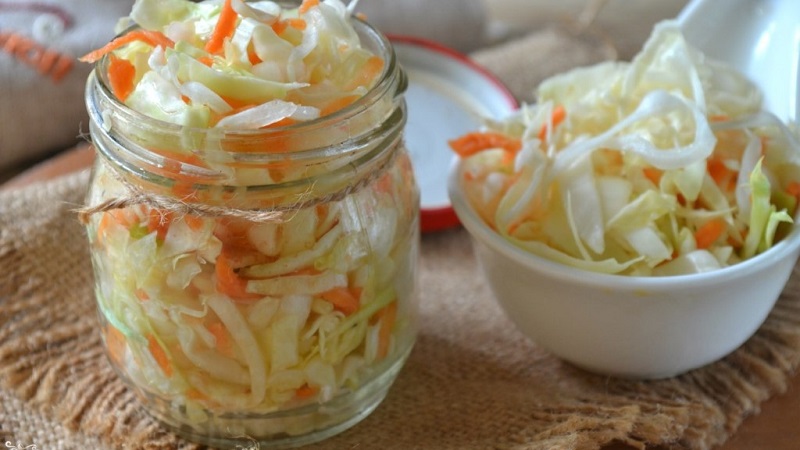
If you compare with each other fermentation, pickling and salting, then the first method will be the least effective. Have sauerkraut shortest shelf life... In addition, it requires special storage conditions. In a warm place, the vegetable deteriorates much faster, so they keep it cool. The reason lies in molds, which begin to multiply actively in the heat.
Salted cabbage is much less whimsical... The high concentration of salt in it prevents the development of both fungi and many pathogenic bacteria, therefore the product is stored even at room temperature. But even pickles it is recommended to store in the cool, since the fermentation processes in them still occur, which over time impairs the taste and appearance of the product.
Pickled cabbage is considered the record holder for storage time... Vinegar destroys all bacteria, so you don't have to worry about fermentation. Thanks to the vinegar marinade, the taste of the dish is preserved for the longest time. Under the conditions of preparation and proportions of ingredients, pickled cabbage stays fresh and crispy for a long time.
Pickled cabbage can be rolled up in jars, and then this product can be determined for long-term storage at room temperature.
Which cabbage is more useful
Of all types of cabbage canning, pickling is considered the most useful and soft... It has several advantages at once. When fermented, a live product is obtained in which all the beneficial bacteria are preserved. In addition, sauerkraut has a minimal salt content.
Another indisputable plus of sauerkraut - the fact that under the influence of lactic acid bacteria, the fiber becomes softer, due to which the product is better absorbed. It is also the least high-calorie: 100 g contains only 19 kcal. Due to such a low energy value, this dish is consumed by those who are on a diet.
In terms of the amount of vitamins, sauerkraut even surpasses fresh one... In the process of fermentation, vitamin B is produced in it, the amount of vitamin C significantly increases.
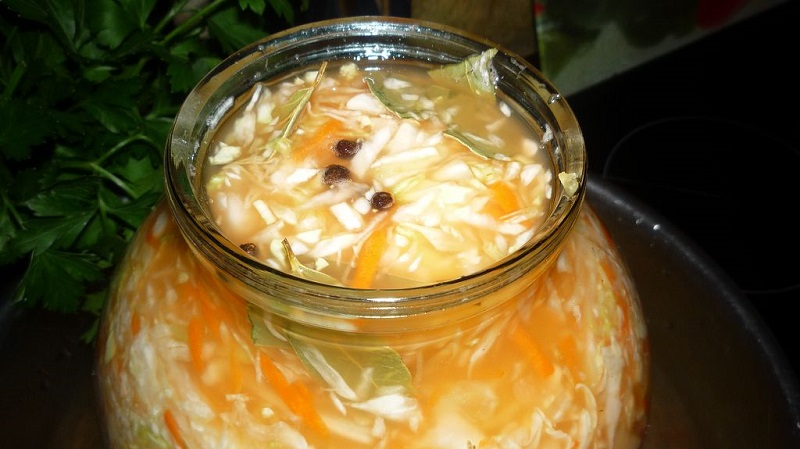
Sauerkraut has a beneficial effect on the body:
- gives the skin a healthy look;
- improves the digestive tract;
- supports the intestinal microflora;
- helps to maintain visual acuity;
- fights inflammatory processes;
- enhances immunity;
- strengthens blood vessels, improves the work of the heart muscle;
- helps to lower cholesterol levels;
- prevents the development of cancerous tumors;
- saturates the body with vitamins;
- promotes the production of the hormone testosterone in men;
- strengthens hair and nails.
Pickling is the mildest way of preservation, which has the least effect on the product and has the least contraindications for use.
Salting is a way of preservation that is much less gentle for the product. But at the same time salted cabbage retains many useful properties:
- the product helps to normalize metabolism;
- strengthens the immune system, acts as an excellent prevention of acute respiratory viral infections;
- improves heart function;
- prevents the formation of calculi in hollow organs;
- improves the functioning of the nervous system;
- helps to fill the lack of useful minerals and vitamins.
You can often hear that pickled foods because of vinegar lose all the beneficial properties and even become harmful. But this is not the case. A vinegar marinade does not negate all the benefits of cabbage, but opens up new qualities in it.
Useful properties of marinated cabbage are:
- has an antihelminthic effect;
- destroys pathogenic microorganisms in the digestive tract;
- strengthens the immune system;
- contributes to the normal functioning of the nervous system;
- improves appetite and metabolism;
- helps to lower blood sugar and cholesterol;
- promotes the absorption of animal protein;
- improves the condition of the skin and hair;
- prevents the occurrence of oncology;
- helps relieve cold and hangover symptoms.
Another an important factor in favor of pickled cabbage is the speed of its preparation... This preserves the nutritional and antioxidant properties of the vegetable.
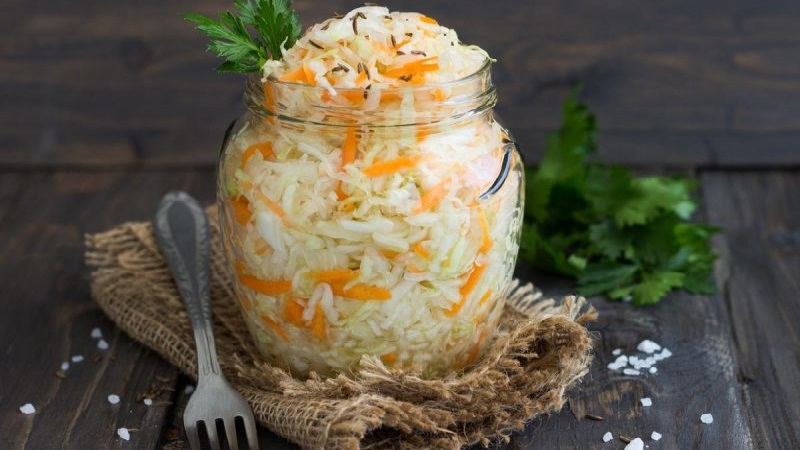
Application
The main application of sauerkraut, salted and pickled cabbage is, of course, cooking.
It's hard to imagine cabbage soup without sauerkraut or salted cabbage, pickled cabbage is ideal for making salads (for example, vitamin and vinaigrette) or as an independent snack. These products are also suitable as a dressing for pies. Any kind of cabbage goes well with meat and poultry. It helps the body to better assimilate animal protein, so it is ideal as a side dish.
These products have also proven themselves as a dietary meal.... They are low in calories, perfectly saturate the body and help fill the lack of vitamins and minerals caused by cutting the diet.
Important! In whole or cut in half cabbage during fermentation, much more nutrients are retained than in finely chopped cabbage.
Another area of application of canned cabbage is traditional medicine.... This product has long been used to maintain beauty. Masks made from it moisturize the skin and have a whitening effect.
Sauerkraut is considered a remedy for bronchial asthma symptoms.... She was even treated for hemorrhoids, making lotions from heated brine.
The bactericidal properties of cabbage are also known.... It was used as an antiseptic when treating wounds.
The brine obtained during fermentation is very valuable.... It improves digestion, helps to remove excess bile. Cabbage brine is recommended for constipation. It speeds up intestinal motility and acts as a mild laxative. Therefore, it is often consumed separately.
Salted cabbage is used exclusively in cooking... It can be used as an independent dish as an appetizer, or it can be included in more complex dishes such as salads.
Harm and contraindications
The benefits of sauerkraut, salted and pickled cabbage are undeniable, but at the same time, do not forget about contraindications.
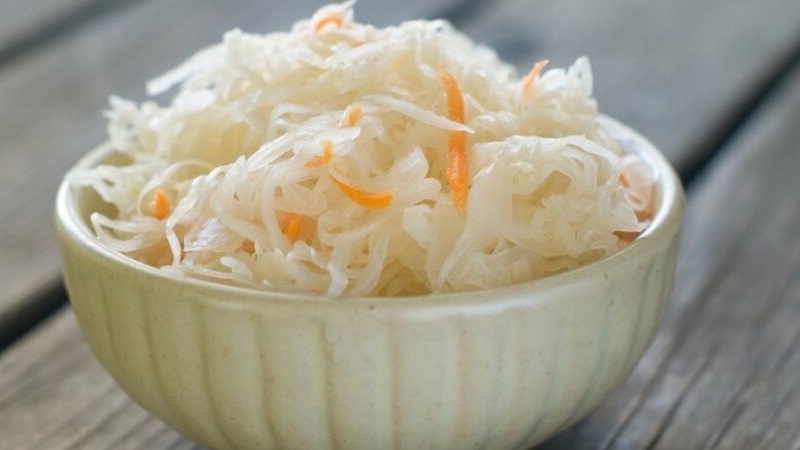
Sauerkraut
Although pickling can be called the most useful way of preservation, cabbage prepared in this way can still harm the body. It has a high acid content... This can provoke or aggravate gastric ulcer and duodenal ulcer.
Salt added during cooking adversely affects kidney and gallbladder function... Another unpleasant property of the product is that it can increase blood pressure.
Sauerkraut contraindicated for people who suffer from such diseases:
- pancreatitis;
- exacerbation of gastritis;
- peptic ulcer of the stomach and intestines;
- increased acidity of the stomach;
- renal failure;
- hypertension;
- urolithiasis disease.
Salted cabbage
This dish contains significantly more salt than the other two. Therefore, the use of salted cabbage can provoke the development of edema and hinder the functioning of the kidneys, especially in the presence of diseases. Salted cabbage can bring serious troubles with some diseases.
It should be excluded from the menu when:
- kidney disease;
- stomach ulcer and gastritis;
- diseases of the duodenum;
- pancreatitis;
- erosion of tooth enamel or wedge-shaped defect.
Pickled cabbage
Eating pickled cabbage can provoke or aggravate a number of diseases and bring a lot of inconvenience to a person... This product is difficult to digest due to the content of coarse fiber, the presence of an acidic marinade can provoke heartburn and eating disorders, aggravate the condition of the stomach and intestines with peptic ulcer disease.
In addition, like any protein, pickled cabbage can provoke allergies.
Pickled cabbage is contraindicated for:
- diseases of the gastrointestinal tract and increased acidity of the stomach;
- kidney disease;
- pancreatitis;
- allergic reactions to this vegetable;
- tendency to swelling;
- flatulence;
- high blood pressure and the risk of developing myocardial infarction.
Conclusion
Cabbage is rich in vitamins and minerals, without which the normal functioning of the human body is impossible. Various methods of preservation help to preserve its beneficial properties during long-term storage - pickling, pickling and pickling.
Each of these methods has advantages, but you should not forget about the possible harm and limitations. If you follow all the recommendations, you can pamper yourself with a variety of healthy and tasty dishes.